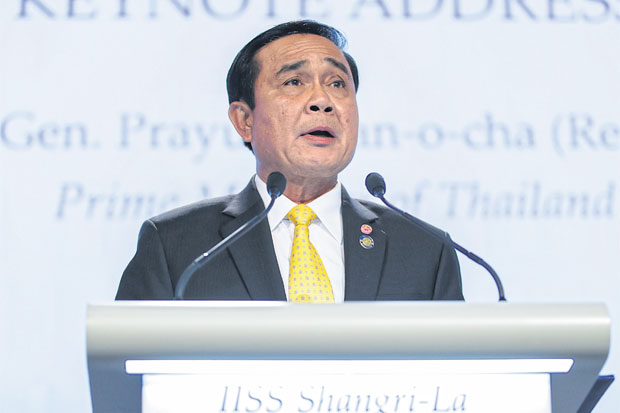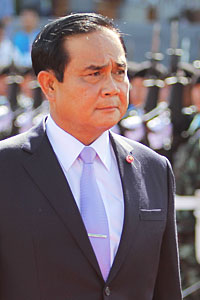
There are seven security challenges to finding a new equilibrium:
First, the tensions in the South China Sea and East China Sea. Thailand believes that Asean must be united on this issue because peace and stability in the region's maritime areas are beneficial to all. All sides must recognise the importance of maritime disputes to preserve peace and stability in the East China Sea and South China Sea; freedom of overflight and freedom of navigation; as well as supporting peaceful resolutions of the disputes in-line with international law, including UNCLOS (United Nations Convention on the Law of the Sea).
Problems in the maritime areas of the region should not become a zero-sum game, which would destroy long-standing good relations and benefit nobody in the end. Thailand thus proposes that all countries in the region, whether claimants or non-claimants, take part in constructive joint activities focused on achieving concrete results and carried out in-line with international law, in tandem with negotiations, so that territorial claims do not become obstacles.
Second, the situation on the Korean Peninsula. North Korea's nuclear programme continues to create tension and is a major cause for concern.
The Six-Party Talks should be revitalised in order to support confidence and lessen tensions through diplomatic channels, and all countries involved should consider increasing humanitarian assistance to the North Korean people and maintain channels of communication with the North Korean government in order to create a conducive atmosphere for dialogue. North Korea should also change its behaviour to become more compatible with the international community and not isolate itself.
Third, terrorism and extremism, the various incidents across the world attest that international terrorism is a regional threat and must be swiftly dealt with through cooperation in order to prevent its spread as well as the spread of extremism. This involves both development measures and military measures, sharing of experiences and best practices, dissemination of knowledge and understanding between religion and race, and addressing the root causes of the problem, such as loss of economic and societal opportunities, poverty, famine, violation of human rights and injustice.
Fourth, the stockpiling of military arms should take place in a limited manner and as necessary to safeguard sovereignty and national interests, and should not be used to assail or threaten other countries.
Fifth, irregular migration is the joint responsibility of the originating countries, transit countries and destination countries, not the burden of any one country. The problem should be addressed at the root causes and Thailand hosted two Special Meetings on Irregular Migration in the Indian Ocean so all sides could jointly resolve this issue. If this issue is not addressed in all aspects, transit countries will tacitly become breeding grounds for human trafficking networks.
Sixth, cybersecurity. In enhancing cybersecurity, countries must set up a dedicated agency responsible for monitoring cybersecurity and ensure that laws covering this issue use compatible standards, including facilitating cooperation on information sharing and technology, as well as human resource development and joint training.
And finally, climate change and disaster mitigation. Climate change affects the prosperity and sustainability of the region and the world. In this regard, natural resources and the environment are global treasures and should be conserved and protected. In the case of mitigating the effect of natural disasters and public hazards, countries in the region should enhance cooperation, share technology and best practices, such as military medicine, humanitarian assistance and disaster relief, military development and military engineers.
THAILAND IN TRANSITION
The security of every country and the region is intertwined. Thailand's future is therefore connected with the stability, prosperity and to regional security of Asean. Thailand stands ready to play a constructive role in laying the foundations for sustainable regional security. Thailand is in transition towards a strong and sustainable democracy. We are facing many complex challenges to our security, while our national security has been affected by poverty, social disparities, the middle-income trap, a fall in agricultural output as a result of drought, and falling commodity prices brought on by the global economic slump. Thailand has also been experiencing unrest in the southern border provinces, which is an internal problem and not a conflict stemming from religious tensions or one with foreign involvement. We are addressing this problem through laws and the normal process of justice, as well as through developing and the fostering of understanding in all aspects.
In addition, Thailand is encountering many difficulties that have come with irregular migration and the need for foreign migrant workers who number in the millions and this has led to many social problems, problems with human trafficking and IUU fishing, including crime and human rights violations. Thailand is fervently expediting the process to address these problems.
Nevertheless, our key problem recently has been political conflict and unprecedented divisions in the country, which has stemmed from a political setting that has produced democracy only in form but not in function.
The rampant corruption, legal deadlocks, rallying of opposing sides, manipulation of the media, the escalation of violence, the breakdown of the rule of law and ultimately, the use of weapons in conflict, led to political conflicts that could not be addressed through democratic process. If left unattended, Thailand would head towards unprecedented civil unrest and perhaps even civil war. There was no other way than to intervene to end hostilities, prevent further conflict, and restore peace and order and bring the country towards a new era of reform. We have no intentions of violating human rights, or to restrict basic rights and freedoms, but it was necessary for the military to take control of the situation to temporarily restore the rule of law and social order, to create peace and stability so that other substantive reforms can be carried out. All our measures have been based on the rule of law, the equal application of the law and law enforcement, and even though they are separated only by a very thin line, taking action when laws have been broken. This should not be considered a violation of human rights. Thailand's current challenge is to find a way to solve these problems and to create understanding within the international community of our situation.
SOLVING THAILAND'S PROBLEMS
The Royal Thai Government is committed to maintaining peace and order, addressing political problems through strengthening our democracy, fostering reconciliation, addressing economic problems, restoring confidence for investors and the international community, combating corruption, reforming and modernising our laws, reforming our civil administration, instituting social orderliness, reducing disparities, developing the country to have a deep-rooted resilience through the adoption SEPs in the national administration to reduce social disparities and promote progress for the country towards a "Thailand 4.0 status". This can be further achieved by supporting the modernisation of five existing industries and supporting capacity-building for five new industries in Thailand.
A 20-Year National Strategic Plan and a roadmap including phase one, two and three were initiated, and anything that cannot be completed during this administration will be handed over to the subsequent government that will come to power through elections. Thailand upholds the democratic process and all of our international obligations as a responsible member of the international community as we have always done, and will return to democracy in accordance with the roadmap.
Conclusion: A new equilibrium for Thailand and a new equilibrium for the region.
Thailand's equilibrium and resilience will help maintain Asean's equilibrium, which will be vital to creating a new strategic equilibrium in the Asia-Pacific. Building sustainable regional security will take time and require trust and political will from all countries, based on the mutual respect for sovereignty and international law, as well as not stipulating one ideology as a condition or prerequisite for cooperation. Viewed from the outside in, one can see the problem and manage it appropriately from the inside out.
A security that has equilibrium and sustainability should have military security coupled with security for development, in particular, for the stability, safety and prosperity of all our peoples. There is room for all of us in the Asia-Pacific to cooperate to build this new equilibrium and make progress together. Thailand stands ready to be a partner and play a constructive role in building stability, prosperity, and sustainability in the region, leaving no one behind.
Lastly, I believe that the Unesco charter states it most appropriately with respect to what we all must do from now on to realise sustainable security. It states the following: "Since war begins in the minds of men, it is in the minds of men that the defences of peace must be constructed."
